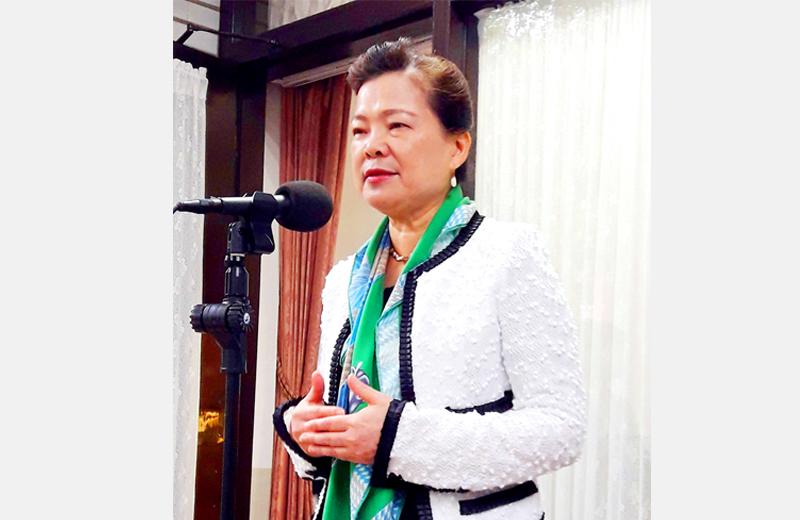Taiwan-US trade relations would remain “on track” regardless of the outcome of yesterday’s presidential elections in the US, Minister of Economic Affairs Wang Mei-hua (王美花) said yesterday.
“Taiwan is a trusted partner of the US,” Wang told reporters at a meeting of the legislature’s Economics Committee in Taipei. “This does not change [depending on] whether the Republicans or the Democrats are in power.”
Taiwan has made significant progress in trade and diplomatic relations with the US in the past few months.

Photo: CNA
Despite protests from China, US Secretary of Health and Human Services Alex Azar met with President Tsai Ing-wen (蔡英文) at the Presidential Office in August. This was followed by a delegation led by US Undersecretary of State for Economic Growth, Energy and the Environment Keith Krach to attend closed-door meetings with government officials and business leaders in Taipei to bolster trade ties.
US President Donald Trump’s bellicose China policy is widely believed to have enabled many of the commercial and diplomatic moves favorable to Taiwan.
On Aug. 28, Tsai announced that the government would on Jan. 1 ease a ban on imports of US pork containing ractopamine and US beef from cattle older than 30 months, despite strong public sentiment, a move that Wang has described as “a necessary precondition” for any bilateral trade agreement with the US.
TRADE TALKS
Asked by reporters how the outcome of the elections might affect possible trade talks with the US, Wang emphasized the importance of “bipartisan support” for Taiwan in the US Congress and the “will of the American people,” rather than tying Taiwan’s gains to a single US political party.
“We have always made friends with the Democrats as well as the Republicans,” Wang said. “The progress we have made in US-Taiwan trade relations in the past few months is due to broad-based positive public sentiment for such policies in the US.”
Saying that the ministry is “in constant contact” with US trade officials, Wang said that she is “waiting to see how things develop” after the elections.
Amid US-China trade tensions and the COVID-19 pandemic, Taiwan has become “the hub for an essential supply chain, especially from the point of view of the US,” she said.
“When US companies look for trusted partners, they look to Taiwan,” Wang said, adding that many leading US tech companies, such as Alphabet Inc’s Google and Microsoft Corp, have “doubled down” on their investments in Taiwan.

MULTIFACETED: A task force has analyzed possible scenarios and created responses to assist domestic industries in dealing with US tariffs, the economics minister said The Executive Yuan is tomorrow to announce countermeasures to US President Donald Trump’s planned reciprocal tariffs, although the details of the plan would not be made public until Monday next week, Minister of Economic Affairs J.W. Kuo (郭智輝) said yesterday. The Cabinet established an economic and trade task force in November last year to deal with US trade and tariff related issues, Kuo told reporters outside the legislature in Taipei. The task force has been analyzing and evaluating all kinds of scenarios to identify suitable responses and determine how best to assist domestic industries in managing the effects of Trump’s tariffs, he

TIGHT-LIPPED: UMC said it had no merger plans at the moment, after Nikkei Asia reported that the firm and GlobalFoundries were considering restarting merger talks United Microelectronics Corp (UMC, 聯電), the world’s No. 4 contract chipmaker, yesterday launched a new US$5 billion 12-inch chip factory in Singapore as part of its latest effort to diversify its manufacturing footprint amid growing geopolitical risks. The new factory, adjacent to UMC’s existing Singapore fab in the Pasir Res Wafer Fab Park, is scheduled to enter volume production next year, utilizing mature 22-nanometer and 28-nanometer process technologies, UMC said in a statement. The company plans to invest US$5 billion during the first phase of the new fab, which would have an installed capacity of 30,000 12-inch wafers per month, it said. The

Taiwan’s official purchasing managers’ index (PMI) last month rose 0.2 percentage points to 54.2, in a second consecutive month of expansion, thanks to front-loading demand intended to avoid potential US tariff hikes, the Chung-Hua Institution for Economic Research (CIER, 中華經濟研究院) said yesterday. While short-term demand appeared robust, uncertainties rose due to US President Donald Trump’s unpredictable trade policy, CIER president Lien Hsien-ming (連賢明) told a news conference in Taipei. Taiwan’s economy this year would be characterized by high-level fluctuations and the volatility would be wilder than most expect, Lien said Demand for electronics, particularly semiconductors, continues to benefit from US technology giants’ effort

‘SWASTICAR’: Tesla CEO Elon Musk’s close association with Donald Trump has prompted opponents to brand him a ‘Nazi’ and resulted in a dramatic drop in sales Demonstrators descended on Tesla Inc dealerships across the US, and in Europe and Canada on Saturday to protest company chief Elon Musk, who has amassed extraordinary power as a top adviser to US President Donald Trump. Waving signs with messages such as “Musk is stealing our money” and “Reclaim our country,” the protests largely took place peacefully following fiery episodes of vandalism on Tesla vehicles, dealerships and other facilities in recent weeks that US officials have denounced as terrorism. Hundreds rallied on Saturday outside the Tesla dealership in Manhattan. Some blasted Musk, the world’s richest man, while others demanded the shuttering of his